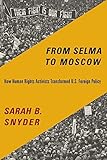From Selma to Moscow : how human rights activists transformed U.S. foreign policy / Sarah B. Snyder.
Material type: TextPublisher: New York : Columbia University Press, [2018]Description: 1 online resource (xi, 301 pages)Content type:
TextPublisher: New York : Columbia University Press, [2018]Description: 1 online resource (xi, 301 pages)Content type: - text
- computer
- online resource
- 9780231547215
- 0231547218
- United States -- Foreign relations -- 1945-1989 -- Case studies
- Human rights advocacy -- Case studies
- États-Unis -- Relations extérieures -- 1945-1989 -- Études de cas
- Défense des droits de l'homme -- Études de cas
- POLITICAL SCIENCE -- Government -- International
- POLITICAL SCIENCE -- International Relations -- General
- POLITICAL SCIENCE -- Human Rights
- Diplomatic relations
- Human rights advocacy
- United States
- 1945-1989
- 327.73009/04 23
- E840 .S595 2018eb
| Item type | Home library | Collection | Call number | Materials specified | Status | Date due | Barcode | |
|---|---|---|---|---|---|---|---|---|
 Electronic-Books
Electronic-Books
|
OPJGU Sonepat- Campus | E-Books EBSCO | Available |
Includes bibliographical references and index.
Human Rights Activism Directed Across the Iron Curtain -- A Double Standard Abroad and at Home? : Rhodesia's Unilateral Declaration of Independence -- Causing Us "Real Trouble" : The 1967 Coup in Greece -- Does the United States Stand for Something? : Human Rights in South Korea -- Translating Human Rights into the Language of Washington : American Activism in the Wake of the Coup in Chile -- "A Call for U.S. Leadership" : Congressional Activism on Human Rights.
Print version record.
The 1960s marked a transformation of human rights activism in the United States. At a time of increased concern for the rights of their fellow citizens--civil and political rights, as well as the social and economic rights that Great Society programs sought to secure--many Americans saw inconsistencies between domestic and foreign policy and advocated for a new approach. The activism that arose from the upheavals of the 1960s fundamentally altered U.S. foreign policy--yet previous accounts have often overlooked its crucial role. In From Selma to Moscow, Sarah B. Snyder traces the influence of human rights activists and advances a new interpretation of U.S. foreign policy in the "long 1960s." She shows how transnational connections and social movements spurred American activism that achieved legislation that curbed military and economic assistance to repressive governments, created institutions to monitor human rights around the world, and enshrined human rights in U.S. foreign policy making for years to come. Snyder analyzes how Americans responded to repression in the Soviet Union, racial discrimination in Southern Rhodesia, authoritarianism in South Korea, and coups in Greece and Chile. By highlighting the importance of nonstate and lower-level actors, Snyder shows how this activism established the networks and tactics critical to the institutionalization of human rights. A major work of international and transnational history, From Selma to Moscow reshapes our understanding of the role of human rights activism in transforming U.S. foreign policy in the 1960s and 1970s and highlights timely lessons for those seeking to promote a policy agenda resisted by the White House
eBooks on EBSCOhost EBSCO eBook Subscription Academic Collection - Worldwide
There are no comments on this title.

